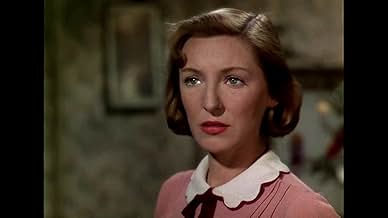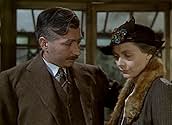NOTE IMDb
7,3/10
4,4 k
MA NOTE
Au lendemain de la Première Guerre mondiale, la famille Gibbons emménage dans une belle maison de banlieue. Ils mènent une vie ordinaire pendant des années, mais tout change lorsque la Secon... Tout lireAu lendemain de la Première Guerre mondiale, la famille Gibbons emménage dans une belle maison de banlieue. Ils mènent une vie ordinaire pendant des années, mais tout change lorsque la Seconde Guerre mondiale éclate.Au lendemain de la Première Guerre mondiale, la famille Gibbons emménage dans une belle maison de banlieue. Ils mènent une vie ordinaire pendant des années, mais tout change lorsque la Seconde Guerre mondiale éclate.
- Réalisation
- Scénario
- Casting principal
- Récompenses
- 1 victoire au total
Robin Burns
- Man in Crowd
- (non crédité)
Mabel Etherington
- Lady in Crowd
- (non crédité)
Dan Lester
- Man in Crowd
- (non crédité)
Jim Morris
- Man Operating Small Boats at Fairground
- (non crédité)
Avis à la une
What really boosts THIS HAPPY BREED into the "superior" category of British films is the direction by David Lean and the two central performances by CELIA JOHNSON and ROBERT NEWTON as the heads of a rather ordinary household living the provincial life between two World Wars. And what is surprising is that this '44 film from the U.K. uses Technicolor in an age when most films, unless they were spectacular musicals, were filmed in B&W. The color photography adds a handsome touch to the otherwise unspectacular story that is more a character study of a marriage and family relationships.
CELIA JOHNSON does a magnificent job as the mother who raises a daughter (KAY WALSH) unsatisfied with her family's social status, who yearns to rise above what she perceives as too provincial and runs off with a married man. It's just one of the many episodic tales in this domestic drama but it's played with such intensity by Johnson that the reunion scene toward the end is heartbreaking to watch.
All of the saga which stretches between the two wars is episodic, told in a series of vignettes which I imagine were done in blackout style on the stage, for which the tale was written. But Lean has successfully managed the transfer to the screen and all of the performances are top notch, particularly ROBERT NEWTON as the concerned father, JOHN MILLS as a man caught in an unrequited love affair and STANLEY HOLLOWAY who provides a good deal of comic relief as a boozy neighborhood friend of Newton.
Noel Coward evidently had more success in telling domestic tales with sharp observation of characters than Edna Ferber did with her own American sagas in which her characters seemed to get lost among all the vast territory she covered.
Summing up: Well worth watching for the performances alone.
CELIA JOHNSON does a magnificent job as the mother who raises a daughter (KAY WALSH) unsatisfied with her family's social status, who yearns to rise above what she perceives as too provincial and runs off with a married man. It's just one of the many episodic tales in this domestic drama but it's played with such intensity by Johnson that the reunion scene toward the end is heartbreaking to watch.
All of the saga which stretches between the two wars is episodic, told in a series of vignettes which I imagine were done in blackout style on the stage, for which the tale was written. But Lean has successfully managed the transfer to the screen and all of the performances are top notch, particularly ROBERT NEWTON as the concerned father, JOHN MILLS as a man caught in an unrequited love affair and STANLEY HOLLOWAY who provides a good deal of comic relief as a boozy neighborhood friend of Newton.
Noel Coward evidently had more success in telling domestic tales with sharp observation of characters than Edna Ferber did with her own American sagas in which her characters seemed to get lost among all the vast territory she covered.
Summing up: Well worth watching for the performances alone.
London between the wars, as seen by a couple of old soldier comrades from 1914-18. Robert Newton is one of them, married to an odd-accented Celia Johnson, with troublesome kids and a spinster relation to support. Stanley Holloway is the other and somehow is the father of the ubiquitous John Mills.
Noel Coward and David Lean worked together to bring their saga into our hearts and minds, as we rejoice in the good times and empathise with the bad ones. It may be hokum, but some of it works.
The best scenes are the quiet ones - especially the scene without dialogue where mum and dad react to bad news. Newton and Johnson also have considerable rapport in their scenes which works well.
Noel Coward and David Lean worked together to bring their saga into our hearts and minds, as we rejoice in the good times and empathise with the bad ones. It may be hokum, but some of it works.
The best scenes are the quiet ones - especially the scene without dialogue where mum and dad react to bad news. Newton and Johnson also have considerable rapport in their scenes which works well.
The movie narrates the happenings of a British family since the first world war (1914-18) until the end second world war (1939-45) . The parents (Robert Newton and Celia Johnson) , the troubled and rebel daughter (Kay Walsh) , the friendly neighbor (Stanley Holloway) , the seaman son (John Mills) and others . Meanwhile , being reflected the course of time and are succeeding various historic deeds , thus : the first and second world wars , the soldiers recruitment , death of the king George , the jolly reception to Minister Chamberlain after the useless Munich Convention with Hitler , the trenches digging in preventing the bombing over London by the Germans .
The movie is interpreted by the greatest English actors with important careers . Robert Newton (Treasure island) , Celia Johnson (Brief encounter) , John Mills (Daughter of Ryan), Kay Walsh (Oliver Twist), Stanley Holloway (My fair lady) . Colorful and glittering cinematography by Ronald Neame , a future director with many successes (Adventure of the Poseidon) . Musical conducting by Muir Mathieson , habitual of English classic films , as he was director of symphonic orchestra of London . The picture begins and finishes with a camera travelling from exterior and interior home what it subsequently would be copied in a lot of films (for example : The Family by the director Ettore Scola) . The motion picture was perfectly directed by David Lean considered the greatest British filmmaker . Rating : Awesome . Above average.
The movie is interpreted by the greatest English actors with important careers . Robert Newton (Treasure island) , Celia Johnson (Brief encounter) , John Mills (Daughter of Ryan), Kay Walsh (Oliver Twist), Stanley Holloway (My fair lady) . Colorful and glittering cinematography by Ronald Neame , a future director with many successes (Adventure of the Poseidon) . Musical conducting by Muir Mathieson , habitual of English classic films , as he was director of symphonic orchestra of London . The picture begins and finishes with a camera travelling from exterior and interior home what it subsequently would be copied in a lot of films (for example : The Family by the director Ettore Scola) . The motion picture was perfectly directed by David Lean considered the greatest British filmmaker . Rating : Awesome . Above average.
This film by David Lean takes us on a journey from 1919 after the First World war towards into WW2. But focuses not on the fighting, but on the home front, and the effects of a changing world.
I love this films ability to take you along with the day to day routine of a large, close knit family. Youre there with their smiles and tears then then in an instant you feel the heartache of their tragedy.
Robert Newton has never been better - a truly mesmerising performance. Forget Long John Silver (although another very fine performance).
The rest of the cast are a brilliant complement to Robert Newton. John Mills is on top form in a cameo performance.
Did David Lean ever make a bad film?
The only down side to the film is you see how great the British Film Industry once was, and now its virtually gone.
I love this films ability to take you along with the day to day routine of a large, close knit family. Youre there with their smiles and tears then then in an instant you feel the heartache of their tragedy.
Robert Newton has never been better - a truly mesmerising performance. Forget Long John Silver (although another very fine performance).
The rest of the cast are a brilliant complement to Robert Newton. John Mills is on top form in a cameo performance.
Did David Lean ever make a bad film?
The only down side to the film is you see how great the British Film Industry once was, and now its virtually gone.
I throughly enjoyed this little gem of a film. It is very well acted and it was nice to see a smart well groomed Robert Newton being a million miles away from Long John Silver. It had some laughs,some drama and quite a bit of sadness and as you get to know the different characters you feel a genuine fondness for them. I was brought up in the 1950's and recall visiting relatives who had grandmas and spinster aunts living with them, just like in this film. Though there is bickering and some harsh words used by the family, it does represent a time when families stuck together and deep down loved and respected one another. If you get the chance to see this movie, then I am sure that you will enjoy it.
Le saviez-vous
- AnecdotesThe voice of the uncredited opening narrator is that of Laurence Olivier.
- GaffesFrank is shown reading a copy of the 16 September 1930 edition of the Daily Mirror with the headline story about the elections in Germany held on 14 September where the Nazi Party increased their seats in the Reichstag from 12 to 107. He then goes to the back yard to help shake out the tablecloth, but the cherry tree there is still in full bloom, months after the blossoms should have disappeared.
- Citations
Frank Gibbons: She didn't pass on, pass over, or pass out! She died!
- Crédits fousOpening credits prologue: This is the story of a London family from 1919 to 1939.
- ConnexionsFeatured in Jonathan Ross' Must-Watch Films: Crime Films (2023)
- Bandes originalesRule Britannia
(uncredited)
Lyrics by James Thomson
Music by Thomas Augustine Arne
Sung by Robert Newton (Frank) and Stanley Holloway (Bob) coming home after their reunion
Meilleurs choix
Connectez-vous pour évaluer et suivre la liste de favoris afin de recevoir des recommandations personnalisées
- How long is This Happy Breed?Alimenté par Alexa
Détails
- Date de sortie
- Pays d’origine
- Langue
- Aussi connu sous le nom de
- This Happy Breed
- Lieux de tournage
- Alderbrook Road, London, Greater London, Angleterre, Royaume-Uni(exteriors of family house near corner with Bellamy St. - still standing in 2022)
- Sociétés de production
- Voir plus de crédits d'entreprise sur IMDbPro
Box-office
- Budget
- 200 000 £GB (estimé)
- Montant brut mondial
- 158 $US
- Durée1 heure 55 minutes
- Rapport de forme
- 1.37 : 1
Contribuer à cette page
Suggérer une modification ou ajouter du contenu manquant

Lacune principale
By what name was Heureux mortels (1944) officially released in India in English?
Répondre






























